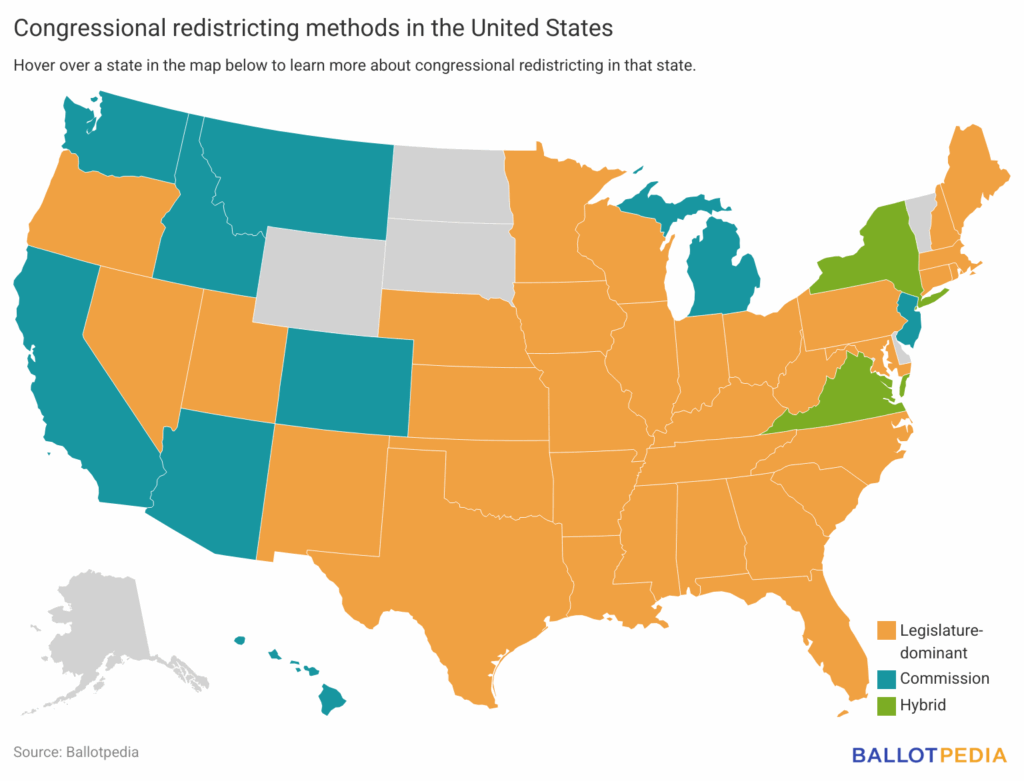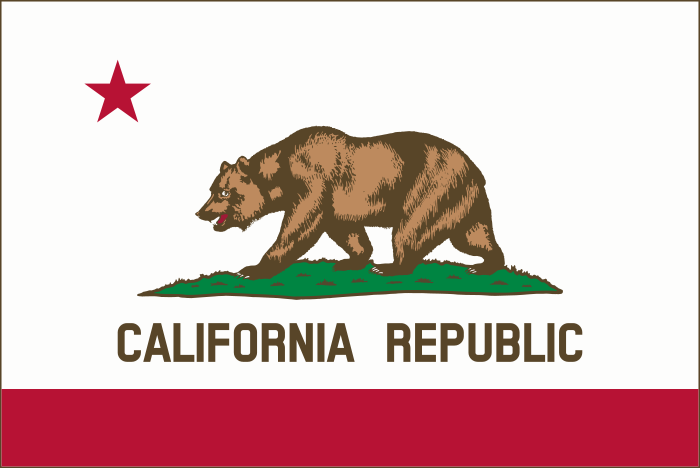The California State Legislature is set to reconvene on Aug. 18 following its summer recess with proposed changes to the state’s redistricting process on the agenda that would go before voters in November. The legislature has until Aug. 22, according to the California Secretary of State, to vote to place a constitutional amendment on the Nov. 4 ballot.
The proposal
At a press conference on Aug. 14, Gov. Gavin Newsom (D) formally announced the proposed amendment, The Election Rigging Response Act, which would make temporary adjustments to the state’s congressional map for elections from 2026 through 2030 if Texas or other GOP-led states make changes to their respective maps. The state would revert to commission-drawn maps after the 2030 census.
Gov. Newsom (D) said, “This moment calls for urgency and action–that is what we are putting before voters this November, a chance to fight back against his anti-American ways.”
While Texas is one of 33 states where the state’s legislature has the power to reapportion congressional districts, California is one of nine that has an independent redistricting commission. In 2010, voters passed Proposition 20, which transferred congressional redistricting from the legislature to the 14-member California Citizens Redistricting Commission. Voters approved the measure 61% to 39%.
Texas Gov. Gregg Abbott (R) called a special legislative session to address multiple topics, including redrawing the state’s congressional districts, on July 21 after President Donald Trump (R) said a mid-decade redistricting effort in Texas could net Republicans five seats and that “there could be some in other states.” On Aug. 3, Democratic members of the Texas House of Representatives left the state to prevent changes to the state's congressional maps. The Texas Senate passed a new congressional map on Aug. 12, but without a quorum in the House, it cannot be voted on. The Texas special legislative session is set to adjourn on Aug. 20, but Gov. Abbott has called for a second special session.
In California, the existing congressional map was adopted in December 2021 by the California Citizens Redistricting Commission, which is made up of five Democrats, five Republicans, and four members belonging to neither party. The commission voted 14-0 to approve the map. Currently, Democrats hold 43 of the state’s 52 U.S. House seats.
As well as voting on a constitutional amendment to authorize the California State Legislature to conduct mid-cycle redistricting, voters will also approve or reject the new map. Gov. Newsom said he believes voters will approve the amendment. He said, “I think the voters understand what’s at stake ... with Donald Trump.”
According to Politico, the proposed map was set to be released Friday, Aug. 15.
Special election to amend the state constitution
Since the commission and the redistricting process were a constitutional amendment, California voters would need to approve another constitutional amendment to make the changes.
A legislatively referred constitutional amendment requires a two-thirds vote in each chamber to send it to voters, which amounts to 54 votes in the state Assembly and 27 votes in the state Senate. Democrats currently hold a 60-19 majority in the state Assembly and a 30-10 majority in the state Senate, meaning the proposal would not require any Republican votes to be placed on the ballot.
State statute also requires that any legislatively referred measure heading to the ballot be voted upon by the state legislature at least 131 days before the election. Since Aug. 22 is past the deadline, state legislators will also need to pass a law changing this requirement for the amendment.
At a press conference held on Aug. 8, Gov. Newsom argued that the special election would require significantly less financial resources to administer since it will coincide with many local elections. The Sacramento Bee reported that more than 20 of the state’s 58 counties have some form of an election scheduled for Nov. 4. The secretary of state estimated the cost of the special election to be more than $200 million. The 2021 recall election against Gov. Newsom cost the state about $200.2 million.
This cost excludes spending by support and opposition campaigns. Charles Munger Jr., who spent over $21 million to pass Propositions 11 and 20, said, “Any attempt to undermine the nonpartisan California Redistricting Commission will be strongly opposed in the courts and at the ballot box.”
Corrin Rankin, chairwoman for the California Republican Party, said the party would “fight it in the courts, at the ballot box and in every community.” U.S. Rep. Kevin Kiley (R-3), who has filed federal legislation to ban mid-decade redistricting in every state, said that California’s existing commission is not perfect but is better than the Democrats’ proposal. Kiley said, “I think it's a very dangerous thing for our state. And that's not just me saying it: It's the Democrat-aligned group Common Cause that fights for fair elections. It's the League of Women Voters of California and a very broad coalition that has come out against this plan.”
Common Cause issued a statement on Aug. 12 stating they were not absolutely opposed to mid-cycle redistricting, saying, “We will not endorse partisan gerrymandering even when its motive is to offset more extreme gerrymandering by a different party. But a blanket condemnation in this moment would amount to a call for unilateral political disarmament in the face of authoritarian efforts to undermine fair representation and people-powered democracy.”
In response to critics saying the proposal goes against the independent drawing process adopted in 2008, Assembly Speaker Robert Rivas (D-29) said, “Once these maps are released, voters will have the opportunity to digest these maps, review them for weeks and months leading to this election. If there is another state with a more transparent process, where voters will get the ultimate say in these new maps, please let me know what it is.”
The last time California voters decided on statewide ballot measures in an odd-numbered year was in 2009. State law limits citizen-initiated ballot measures to even-numbered year general elections in November but allows the state legislature to call for special elections for legislatively referred measures.
Other states considering mid-cycle redistricting
Several other states are considering mid-cycle redistricting. Gov. Mike Kehoe (R) is considering calling a special session in Missouri where Republicans currently hold six of the state’s eight U.S. House seats. Florida Gov. Ron DeSantis (R) said he was also considering mid-cycle redistricting. The Florida State Legislature is responsible for drawing congressional and state legislative lines in the state.
Similar to California, New York is considering working outside of their independent redistricting commission to allow for mid-decade redistricting. Gov. Kathy Hochul (D) supports the proposal, saying if Texas adopts a new map, New York must do the same. The change would also require a constitutional amendment, which means the new maps would be in place for the 2028 election at the earliest.
Democratic leaders in the Maryland State Legislature said they would also consider proposing new districts if Texas adopts a new map.
The map below shows which method each state employs to draw congressional districts. The states in grey have only one congressional district.

Redistricting commission ballot measures
From 1983 to 2024, there were 15 ballot measures to create non-politician redistricting commissions, also known as independent redistricting commissions, in 10 states. Voters approved 10 and rejected five ballot measures. The most recent vote was in Ohio in 2024 where voters rejected an initiated constitutional amendment to establish the Ohio Citizens Redistricting Commission (CRC), a 15-member non-politician commission responsible for adopting state legislative and congressional redistricting plans. The vote was 46% in favor of the amendment to 54% opposed.
There has been at least one ballot measure to repeal a non-politician redistricting commission. In 2010, voters in California rejected Proposition 27, which would have eliminated the state's Citizens Redistricting Commission. It was defeated with 59% of voters opposing it.
Additional reading:



